MEXICO CITY (AP) — Mexican President Claudia Sheinbaum prioritized bilateral meetings on the sidelines of the Group of Seven (G7) summit in Canada on June 17, 2025, viewing them as more significant than the summit itself. Her scheduled face-to-face meeting with U.S. President Donald Trump was set to be a highlight of the trip.
However, Trump's early departure back to Washington left a significant gap in Mexico's diplomatic agenda and postponed the anticipated encounter between Sheinbaum and Trump. Sheinbaum was expected to advocate for Mexico's advancements in security and immigration while negotiating to lift steel and aluminum tariffs and lobby against a proposed tax on remittances sent by Mexicans living in the U.S.
On June 17, Sheinbaum reported via the platform X that she had conversed with Trump via phone, where he explained his need to return due to the ongoing Israel-Iran conflict. She stated, “We agreed to work together to soon reach an agreement on various issues that concern us today,” reflecting a commitment to collaboration between the two nations.
Sheinbaum’s diplomatic relationship with Trump has become a topic of intrigue, with some suggesting she might be seen as a “Trump whisperer.” She has successfully navigated potentially detrimental tariff threats through respect and diplomacy, which are critical in handling relations with the U.S., while also occasionally employing humor and standing her ground when necessary.
Jorge Alberto Schiavon Uriegas, a professor at Iberoamerican University, noted that the planned meeting with Trump was on neutral ground and closed to the press, which could have fostered a constructive dialogue without the pressure of media scrutiny, unlike previous Oval Office meetings that have been challenging for leaders from Ukraine and South Africa.
While the bilateral agenda between Mexico and the U.S. remains largely the same, there are signs of a shift in priorities. The recent decline in cross-border migration has shifted this topic from the forefront for the first time in years. Regarding security, Sheinbaum has effectively mitigated some of Trump's tough stance on fentanyl and organized crime by increasing the pursuit of drug cartels. In February, Mexico extradited over two dozen drug cartel figures to the U.S., including Rafael Caro Quintero, leading to positive feedback from the Trump administration.
U.S. Deputy Secretary of State Christopher Landau remarked that greater cooperation on security issues may be on the horizon, after a visit with Sheinbaum. However, concerns over remittance income threaten Mexico's economy, particularly with a proposed tax on these funds, which amounted to nearly $65 billion in the previous year. Recent reports indicated a 12% decline in remittances in April, marking the largest drop in over a decade, which Sheinbaum attributed to immigration policies of the Trump administration.
Sheinbaum's attendance at the G7 highlights a shift in Mexico's foreign policy focus after her predecessor, Andrés Manuel López Obrador, often chose to skip significant multilateral gatherings. This shift is crucial for Mexico, allowing the country to reposition itself within global dialogues. Michael Shifter, a Latin American Politics professor at Georgetown University, emphasized that although missing the meeting with Trump is a setback, Sheinbaum's interactions with leaders from India, Germany, and Canada are equally vital as Mexico seeks to diversify its international alliances.
Nonetheless, an in-person meeting with Trump is essential for Sheinbaum, as the influence of U.S. decisions on Mexico's policies remains significant. Shifter pointed out, “At the end of the day, there’s only one person who makes decisions here,” underscoring the importance of Trump in the bilateral relationship between the two nations.












